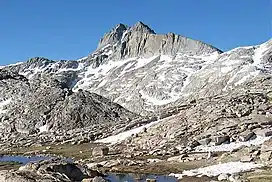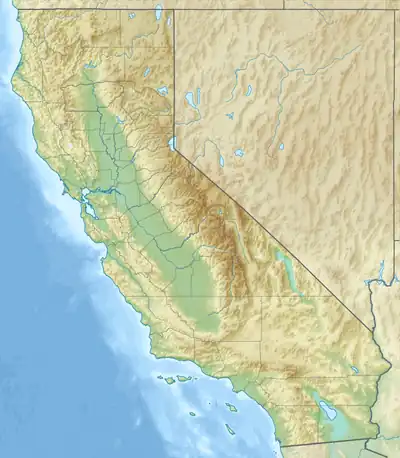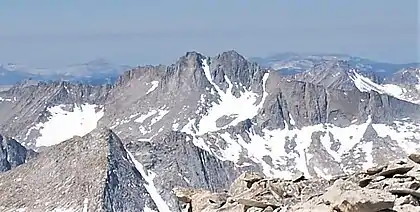Gemini (California mountain)
Gemini is a 12,880-foot-elevation (3,926-meter) twin-peaked mountain summit located west of the crest of the Sierra Nevada mountain range in Fresno County of northern California, United States.[3] It is situated in the John Muir Wilderness, on land managed by Sierra National Forest. It is set 3.0 miles (4.8 km) west-southwest of Merriam Peak, 2.6 miles (4.2 km) northeast of Mount Senger, and 1.2 miles (1.9 km) southeast of Seven Gables, the nearest higher neighbor.[1] Topographic relief is significant as it rises over 3,500 feet (1,067 meters) above Piute Canyon in approximately three miles. Gemini ranks as the 176th-highest summit in California.[2]
| Gemini | |
|---|---|
 North aspect | |
| Highest point | |
| Elevation | 12,880 ft (3,926 m)[1] |
| Prominence | 800 ft (244 m)[1] |
| Parent peak | Seven Gables (13,080 ft)[2] |
| Isolation | 1.30 mi (2.09 km)[2] |
| Listing | Sierra Peaks Section |
| Coordinates | 37°17′48″N 118°49′01″W[3] |
| Naming | |
| Etymology | Gemini twins |
| Geography | |
 Gemini Location in California  Gemini Gemini (the United States) | |
| Location | Fresno County, California, U.S. |
| Parent range | Sierra Nevada[1] |
| Topo map | USGS Mount Hilgard |
| Geology | |
| Age of rock | Cretaceous |
| Mountain type | Fault block |
| Type of rock | granite |
| Climbing | |
| First ascent | 1953 |
| Easiest route | class 2[2] |
History
The first ascent of the summit was made July 30, 1953, by Jim Koontz and Rosemarie Lenel.[4] The mountain's name was suggested by Chester Versteeg, a prominent Sierra Club mountaineer from Los Angeles.[5] The peak's name was officially adopted in 1954 by the U.S. Board on Geographic Names and promulgated in 1957.[3] Today this peak draws climbing interest because it is included on the Sierra Peaks Section's peak bagging list.
Climate
According to the Köppen climate classification system, Gemini is located in an alpine climate zone.[6] Most weather fronts originate in the Pacific Ocean, and travel east toward the Sierra Nevada mountains. As fronts approach, they are forced upward by the peaks, causing them to drop their moisture in the form of rain or snowfall onto the range (orographic lift). Precipitation runoff from this mountain drains into tributaries of the South Fork San Joaquin River.
References
- "Gemini, California". Peakbagger.com. Retrieved 2021-05-12.
- "Gemini - 12,900' CA". listsofjohn.com. Retrieved 2021-05-12.
- "Gemini". Geographic Names Information System. United States Geological Survey, United States Department of the Interior. Retrieved 2021-05-12.
- Hervey Voge, James W. Koontz II, and George Bloom, A Climber’s Guide to the High Sierra, (1954)
- Erwin G. Gudde, California Place Names, University of California Press, 1969, ISBN 9780520266193, page 142.
- Peel, M. C.; Finlayson, B. L.; McMahon, T. A. (2007). "Updated world map of the Köppen−Geiger climate classification". Hydrol. Earth Syst. Sci. 11. ISSN 1027-5606.
External links
- Weather forecast: Gemini
